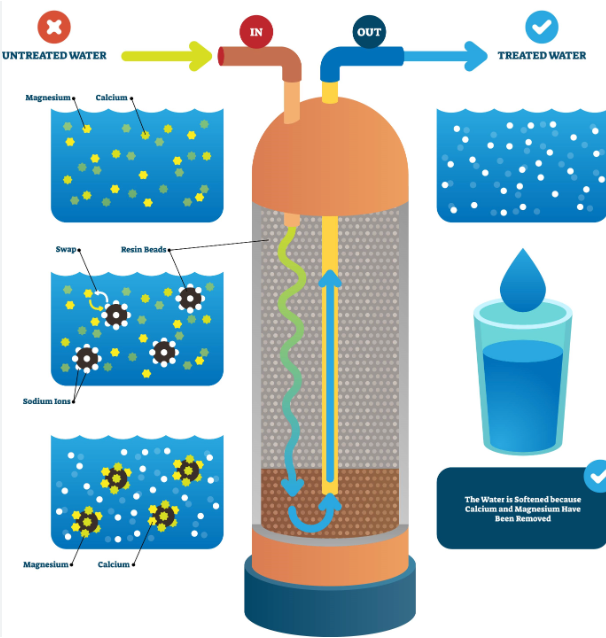Water Softener: Work in Steam Boilers
A water softener can be connected to a boiler to help prevent the buildup of scale, which can reduce efficiency and shorten the lifespan of the boiler.
A water softener works by using a process called ion exchange. The water softener contains a resin that has positively charged ions attached to it. When hard water flows through the resin, the calcium and magnesium ions in the water are attracted to the positively charged resin and are exchanged for sodium ions. The sodium ions are not considered to be hard water minerals, so they do not form scale.
The resin in a water softener can only hold a certain amount of hardness ions before it needs to be regenerated. Regeneration is the process of flushing the resin with a concentrated solution of salt water. This solution replaces the sodium ions on the resin with new hardness ions, which can then be exchanged for more calcium and magnesium ions from the water.
Water softeners are typically installed in the home’s water supply line before the water enters the boiler. This ensures that all of the water that flows through the Steam boiler is soft water.
Here are some of the benefits of using a water softener in a Industrial boiler:
- Prevents scale buildup, which can reduce efficiency and shorten the lifespan of the Steam industrial boiler
- Improves heat transfer, which can save energy
- Reduces the risk of leaks and other damage to the boiler
- Extends the life of the boiler
Water is important for life, but hard water can cause problems. Hard water contains high levels of minerals like calcium and magnesium. These minerals can build up in pipes and appliances, causing them to malfunction. They can also make your hair and skin feel dry and your clothes feel stiff.
A water softener system can help to remove these minerals from your water. This will make your water softer and prevent it from causing problems. Water softener systems are a good investment for homes with hard water.
A water softener removes hard water minerals, like calcium and magnesium, which can cause scaling and damage in the boiler tubes. Acting as an insulator, scale deposits can prevent proper heat transfer, decrease boiler efficiency, and lead to costly downtime and even premature boiler failure. In a pressurized system, this can lead to failure of the boiler.

Water softener reduces the hardness to near zero, thus considerably reducing the risk of scale build up.The Water Softeners are simple in operation, highly efficient and compact units designed to produce soft water efficiently and economically.
Understanding the Impact of Hard Water
Hard water, with its elevated mineral content, can create numerous complications throughout your household. When hard water flows through your plumbing systems, it leaves behind mineral deposits, also known as scale, which can gradually accumulate and cause significant issues. Scale build-up can lead to reduced water flow, decreased efficiency of appliances, and potential damage to pipes, fixtures, and water-based equipment.
The Role of Water Softeners
Water softeners are innovative devices designed to address the problems caused by hard water. These systems employ a process known as ion exchange to remove the calcium and magnesium ions responsible for water hardness, replacing them with sodium or potassium ions. By effectively neutralizing the hard water minerals, water softeners prevent scale formation and provide a multitude of benefits for your entire household.
Benefits of Water Softeners
- Scale Prevention: The primary function of water softeners is to prevent the formation of scale in your plumbing systems and appliances. By removing the hard water minerals, water softeners significantly reduce the accumulation of scale, ensuring optimal performance and extending the lifespan of your investments.
- Enhanced Appliance Efficiency: Appliances such as washing machines, dishwashers, and water heaters are particularly susceptible to the damaging effects of hard water. By using a water softener, you can eliminate the negative impact of scale build-up, leading to improved efficiency, lower energy consumption, and decreased maintenance costs.
- Extended Lifespan of Plumbing Systems: Hard water can gradually deteriorate your plumbing infrastructure, resulting in pipe corrosion, clogs, and leaks. Water softeners mitigate these risks by preventing scale formation, ensuring your plumbing systems remain in excellent condition for years to come.
- Cleaner and Softer Fabrics: Hard water can leave behind mineral residues on clothes and linens, leading to stiff and dull-looking fabrics. By installing a water softener, you can enjoy cleaner and softer laundry, as well as brighter and longer-lasting colors.
- Healthier Skin and Hair: Hard water minerals can strip away natural oils from your skin and hair, leaving them dry, itchy, and prone to irritation. Water softeners help maintain the natural moisture balance, resulting in healthier skin and shinier, more manageable hair.
Choosing the Right Water Softener
When selecting a water softener system, it is crucial to consider various factors, such as the hardness level of your water supply, the size of your household, and the specific needs of your plumbing systems. Consulting with a professional water treatment specialist can help you identify the most suitable water softener for your requirements.
Installation and Maintenance
Professional installation of your water softener system is recommended to ensure proper functioning and optimal performance. Regular maintenance, including routine check-ups, salt replenishment, and resin bed cleaning, is essential to keep your water softener operating efficiently.
In conclusion, hard water can wreak havoc on your plumbing systems, appliances, and overall household comfort. However, with the installation of a high-quality water softener system, you can effectively eliminate the detrimental effects of hard water minerals. By preventing scale formation, water softeners provide a wide range of benefits, including enhanced appliance efficiency, prolonged lifespan of plumbing systems, cleaner fabrics, and healthier skin and hair.
Investing in a water softener is an investment in the long-term functionality and well-being of your home. Say goodbye to the frustrations of hard water and experience the numerous advantages of a water softener system. Choose a reliable water treatment specialist to guide you through the process, and enjoy the benefits of soft, pure water flowing through your home.
Water Softener hard water in boiler FAQ
A water softener is a device that removes calcium and magnesium ions from water, making it softer. Hard water contains high levels of these minerals, which can cause scale buildup in pipes, appliances, and fixtures. Scale buildup can reduce the efficiency of boilers and other water-using appliances, and it can also make it difficult to clean clothes and dishes.
A water softener can help to prevent scale buildup in boilers, which can improve efficiency and extend the life of the boiler. Hard water can cause scale buildup on the inside of the boiler, which can reduce heat transfer and efficiency. This can lead to higher energy bills and premature boiler failure. A water softener can help to remove the calcium and magnesium ions that cause scale buildup, so that the boiler can operate more efficiently and last longer.
If you have hard water, a water softener can help to extend the life of your boiler and improve its efficiency. However, if you have soft water, you may not need a water softener.
The cost of a water softener varies depending on the size and type of softener you need. The average cost of a water softener is around rs 8,0000.
The cost of installing a water softener varies depending on the location of your home and the type of installation you choose. The average cost of installation is around Rs 3500.
The frequency of regeneration depends on the amount of hard water you use. In general, you will need to regenerate your water softener every 2 to 4 weeks.
There are a few ways to tell if your water softener is working properly. One way is to check the water hardness before and after using the softener. You can also check the regeneration cycle to make sure it is running properly.
The most important thing you can do to maintain your water softener is to add salt to the brine tank regularly. You should also flush the softener periodically to remove any buildup of minerals.
The benefits of using a water softener include:
Improved water quality
Reduced scale buildup
Increased efficiency of water-using appliances
Extended life of water-using appliances
Easier cleaning of clothes and dishes
The drawbacks of using a water softener include:
The initial cost of the softener and installation
The need to add salt to the brine tank regularly
The need to flush the softener periodically
The possibility of water softener failure
Buy Boiler Spare Parts at the Best Price
Thermodyne Boilers supplies 100+ Industrial Boiler Parts all over India. Contact our sales team & send your requirement to get prices & discounts
